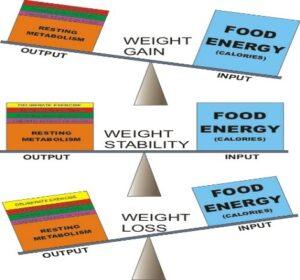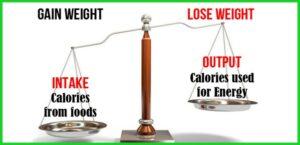
Law of Conservation of Energy – Total energy remains constant and is conserved over time. Energy cannot be created nor destroyed, only transformed from one form to another. Energy associated with weight gain, management, and loss all focus on the amount of energy consumed, stored, and expended.
Metabolic Energy – is the energy used to breakdown and release stored energy in chemical bonds from food sources and the energy used to build, repair, and reproduce tissues and cells within the living organism. With weight loss and management, energy is consumed as nutrients and processed through metabolic processes in the body. Catabolic metabolism breaks larger compounds into smaller particles, which releases stored energy in chemical bonds. Anabolic metabolism requires energy to fuse smaller particles together making larger compounds, which stores energy in the newly formed chemical bonds.
Nutrients – are essential substances necessary to sustain living processes. There are six essential nutrients: Carbohydrates, Proteins, Fats, Vitamins, Minerals, and Water. Having adequate intake of nutrients is essential for healthy biological processes and being deficient of one or more results in physical illness and potentially death. A well-balanced diet consists of proportionate quantities of nutrients and results in optimal health and maintenance of the body.

Calories – are the units given to energy expenditure from nutrients. Defined as the amount of energy necessary to raise 1 gram of water 1 degree Celsius. However, nutritional calories are actually Kilocalories, which is the amount of energy necessary to raise 1 kilogram (1000 grams) of water one degree Celsius. Of the nutrients used for metabolism, Carbohydrates, Proteins, and Fats, the caloric value of each are considered when evaluating daily calorie consumption.

One gram of Carbohydrate = 4 calories
One gram of Protein = 4 calories
One gram of Fat = 9 calories
One gram of Alcohol = 7 calories.
50-60 percent of your daily calorie consumption should be from carbohydrates. 12-20 percent of your daily calorie consumption should be from proteins. 30 percent of you daily calorie consumption should be from fats.

